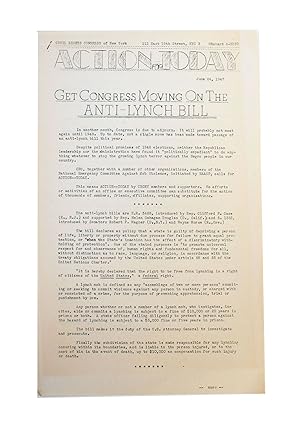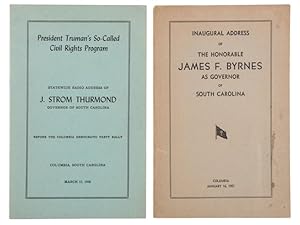Lynching African American (2 results)
Product Type
- All Product Types
- Books (1)
- Magazines & Periodicals
- Comics
- Sheet Music
- Art, Prints & Posters
- Photographs
- Maps
-
Manuscripts &
Paper Collectibles (1)
Condition
- All Conditions
- New
- Used
Binding
- All Bindings
- Hardcover
- Softcover
Collectible Attributes
- First Edition
- Signed (1)
- Dust Jacket
- Seller-Supplied Images
- Not Printed On Demand
Seller Location
Seller Rating
-
Action for Today newsletter. Civil Rights Congress of New York: 1947. Mimeographed newsletter measures 14 x 8.5 inches. 2 pages. Newsletter regarding the anti-lynching bill before Congress reads in part, "Despite political promises of 1946 elections, neither the Republican leadership nor the administration have found it 'politically expedient' to do anything whatever to stop the growing lynch terror against the Negro people in our country." The first federal anti-lynching bill was introduced in 1918 in the House of Representatives before southern Democrats blocked its Senate passage. Some version of the bill was reintroduced throughout the rest of the twentieth century and continuously blocked. It would not be until 2020 that the Emmett Till Anti-lynching Act was passed and signed into law in 2022, making lynching a federal crime at long last. The newsletter details the 1947 anti-lynching bill H.R. 3488 and goes on to list actionable steps for readers. Creased where folded. Very light toning to edge of front page. In very good condition.
-
2 Speeches by 2 South Carolina Governors Commenting on Lynching, 1948 and 1951
Manuscript / Paper Collectible
Small archive of two pamphlets with transcripts of speeches concerning anti-lynching legislation. THURMOND, J. Strom. President Truman's So-Called Civil Rights Program. Columbia, SC: [Columbia Democratic Party], 1948. BYRNES, James F. Inaugural Address of the Honorable James F. Byrnes as Governor of South Carolina. Columbia, SC: N.p., 1951. At the time that this description is being written, just five copies are recorded in American institutions. OCLC search results are at best an estimate and can vary over time. Together, 2 pamphlets, 8vo. In a statewide radio address, Strom Thurmond vehemently opposes President Truman's Civil Rights Bill including, notably, its anti-lynching provision. He warns that any intrusion of federal government on states rights will lead to future violations, a familiar strategy for opposing both abolition and civil rights. "Does this sound like an American concept to you? Does this kind of thing coincide with your ideas of liberty and freedom which we have fought for and thought we had? If the government in Washington can pass this law, it will have like power to intrude itself into every phase of the daily lies of our people and regulate them in all things, large and small." He makes a point of dismissing the anti-lynching part of the legislation claiming the crime no longer a pressing issue, "The proposed law is unnecessary because enlightened public opinion has virtually stamped out this crime. It has never been a sectional crime, although some would create the contrary impression for propaganda purposes." Lynching, the premeditated and most often widely publicized and promoted murder of African Americans by mob violence, was a common strategy utilizing terror in order to block civil rights efforts. Two years later in his inaugural address, new South Carolina governor James F. Byrnes addresses lynching in shaded language, " If a man violates the law he should be arrested by local officers.If a man does not violate the law, no group of men has the right to assault him or to threaten and intimidate him.I recommend that the Legislature enact a law similar to the Alabama statute prohibiting persons over 16 years of age parading on the streets or highways while masked, and also to prohibit such persons entering upon the premises of a citizen to threaten or intimidate him." He goes on, "I will be the governor. I do not need the Ku Klux Klan nor do I want interference by the National Association for the Advancement of Colored People." Byrnes goes on to laud a separate but equal South, claiming "The overwhelming majority of colored people in this State do not want to force their children into white schools.what the colored people want, and what they are entitled to, is equal facilities in their schools." Terrorism by mob violence kept African Americans from sending their children to integrated schools or claiming other rights of citizenship. Separate but equal, a linguistic fallacy, marked the ambivalence of southern legislators like Thurmond and Byrne and stalled meaningful change for decades. Lynching continued in South Carolina through the 1960s largely unabated by local or state officials. A federal anti-lynching law was not passed until 2022.



